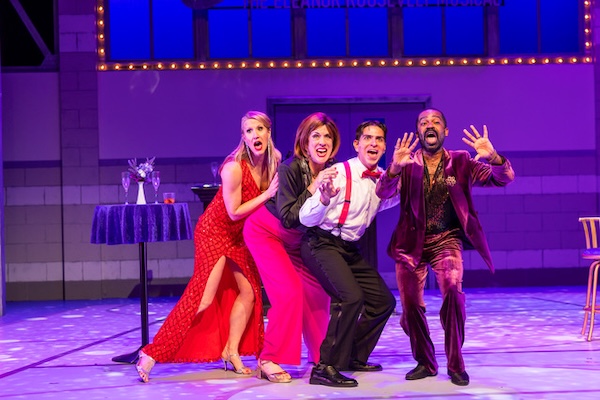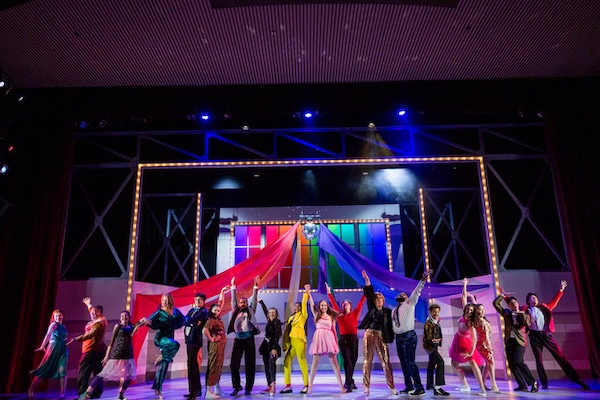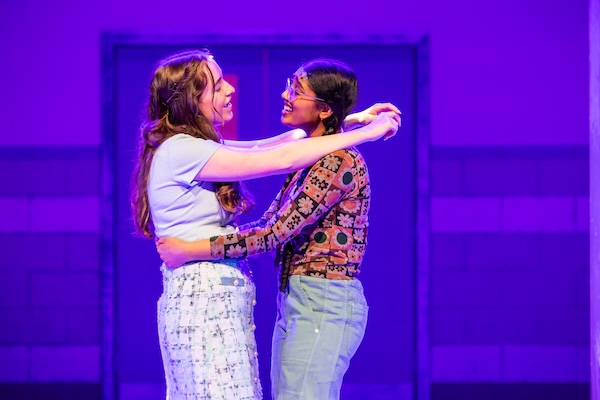Theater Review: Wheelock Family Theatre’s “The Prom” — More Than Entertainment
By Joan Lancourt
Theater like this is especially crucial at a time of destructive national division: it is explicitly aimed at intergenerational audiences, it takes on issues that confront family and community, and it makes the experience of learning and relearning elemental democratic lessons both fun and communal.
The Prom Book and lyrics by Chad Beguelin. Book by Bob Martin. Music by Matthew Sklar. Based on the original concept by Jack Viertel. Director/choreographer: Larry Sousa. Music director: Jordan Oczkowski. Staged by Wheelock Family Theatre at 200 The Riverway, Boston, through June 8.

A scene from the Wheelock Family Theatre production of The Prom. Photo: Nile Scott
If Wheelock Family Theatre’s production of The Prom were a team in a baseball game, it would be accurate to say that it put several home runs on the scoreboard. That’s because the staging finds the sweet spot between “entertainment” and “more than entertainment.”
As “entertainment,” the production offers a steady stream of fast-paced, high-spirited song and dance numbers that engage an intergenerational audience. Regarding its success as “more than entertainment,” the proceedings on the night I attended kept a young lesbian couple sitting a few rows in front of me exchanging urgent-sounding whispers at many key points in the story. I found myself frequently watching them out of the corner of my eye to make sure I didn’t miss any of those key points.
The story is not new. It’s a tale of two high school seniors who fall in love and look forward to going to the Prom together — an utterly normal phase in teen development. The “glitch” — they are both girls! To prevent this so-called abnormal relationship from poisoning the prom, one outspoken mother pressures the school principal to cancel the event. The town’s legal counsel, however, informs them that cancellation would be a civil rights violation. Undeterred, the parents organize another “secret” prom. Thereafter, the plot’s many convolutions progress apace to a rousing denouement: young love torn asunder, followed by scenes of wrenching self-doubt on the part of the lesbian couple, and finally, to the awakening in one of them of the courage to fight back.

A scene from the Wheelock Family Theatre production of The Prom. Photo: Nile Scott
What makes The Prom “more than entertainment” is the way its social messages are seamlessly threaded throughout a compelling storyline. The drama clearly offers a lesson in how a series of individuals and a whole town (surrogate for a nation or the world?) can be transformed from homophobia to an acceptance of life-affirming inclusivity. A sassy deus ex machina device is brought in to assist the metamorphosis: a troupe of failing celebrity activists descends on this small American town to help save the young lesbian couple from being demonized. Of course, the celebrities’ selfish motives initially only make things worse. But that soon gives way to a commitment to the struggle for social justice.
The musical shows how an “incident” (the cancellation of a high school prom) is turned into an “issue” that becomes a “cause” once it receives national publicity. Along the way, the show reframes the problem — from “being gay is a biblical sin” to “it’s the way God made me.” We are then treated to examples of how tiny sparks of courage can be fanned into full-fledged flames of defiance, and we experience how liberating it is to resist the pressure to be defined by what others want you to be. In The Prom, young people learn that they have agency — that together they can act as a force for inclusive change. The dialogue underlines this insight: “Life is no dress rehearsal”; “This is not about the Prom, it’s about right and wrong”; and “Not everyone gets a chance to step out of the chorus.” The emergence of this “new normal” triggers a number of individual transformations — on the part of the celebrity activists as well as in one especially homophobic mother.

A scene from the Wheelock Family Theatre production of The Prom. Photo: Nile Scott
Of course, in real life, transformations like these do not happen as quickly as they do on the WFT stage. And not everyone will agree with the lyrics’ strategy of sparking the courage of “one lesbian at a time,” or that “all it takes is you, me and a song.” Still, the production builds to what many seasoned activists would consider a crucial tipping point: a scene in which the students exercise their newfound power as a collective and confront the adults. This shifts the struggle in an important way — from individual growth to the establishment of a collective, sociocultural realignment.
Finally, and not incidental to the production’s success, are the more traditional elements of good theater. The large cast is uniformly excellent, with bits of extra sparkle from Maureen Keiller and Davron S. Monroe as two of the celebrity activists, and compelling, heartfelt performances from David Jiles Jr. as the school principal and Siri Manju as the courageous young lesbian. The costumes are just right, and a simple but flexible set that incorporates a clever use of the Applebee and 7-Eleven logos allows for smooth transitions from one scene to another. The music is appropriately rhythmic, although the score doesn’t supply memorable melodies or lyrics. But the voices of the WFT cast are good, and the dancing is appropriately athletic and well executed, despite the lack of innovative choreography.
Also commendable is how The Prom gives a brief nod to the power of theater itself to change the world. In an exchange between the school principal and one of the celebrity activists, we hear a back and forth about whether theater is essentially an escape from the “soul crushing” day-to-day lives of gay people or if it can be a place of healing. The WFT production usefully suggests that theater can play a large role in pursuit of the latter as it pursues social justice. Theater is both/and: individual and collective change as well as entertainment and more than entertainment. Theater like this is especially crucial at a time of destructive national division, especially in the way it takes on issues whose underlying value-base is forged in that intergenerational space of family and community, and it makes the experience of learning and relearning elemental democratic lessons both fun and communal.
Joan Lancourt, Ph.D., is a local author, most recently of More Than Entertainment: Democracy and the Performing Arts –– Junior Programs, Inc. (1936-1943) Pioneers of Theater for Young Audiences. The book’s website is www.juniorprogramsbook.com
